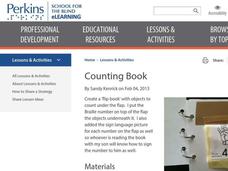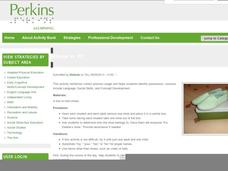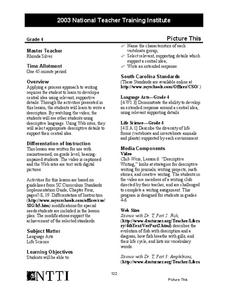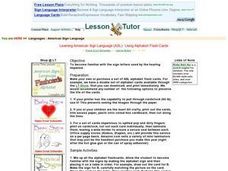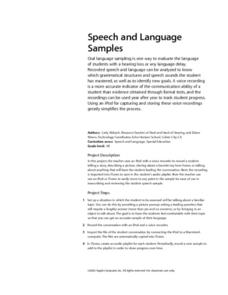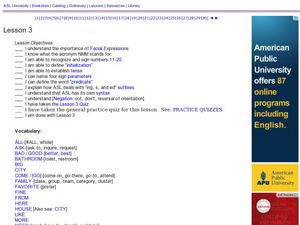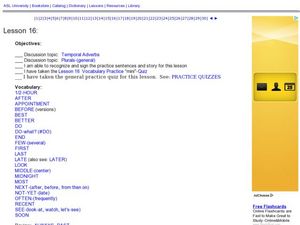Perkins School for the Blind
Baseball
Baseball is an American pastime, super fun to play, and can be made accessible to learners with visual impairments. Instead of taking to the ball field, your class can learn the rules of the game by playing a small three-dimensional...
Perkins School for the Blind
What Would You Do If...?
What would you do if...? That's a great question, and, when posed to learners with visual impairments, a question that can foster concept development and speaking and problem-solving skills that relate to real-life situations. The...
Perkins School for the Blind
Counting Book
Here is a wonderful way to teach children with visual impairments how to count and build number recognition skills. Included, you will find a set of instructions on how to create a counting book from card stock, jump rings, and cotton...
Perkins School for the Blind
Learning to Express Myself
Expressing one's wants and needs is vital for learners of any age or ability level. Young children with visual impairments and intellectual disabilities practice asking for preferred items, foods, or activities in a structured manner....
Perkins School for the Blind
Familiar Sounds
To foster concept development and auditory discrimination skills, learners with visual impairments listen to identify a variety of common sounds. The teacher makes recordings of various sounds, including those found in the home, at the...
Perkins School for the Blind
Left Versus Right
When you can't see, it is extremely important to be able to reorient yourself. Learners with visual impairments work though an activity to build spacial awareness based on moving left and right. A marker (bracelet, bell, or weight) is...
Perkins School for the Blind
Grocery Shopping
Grab those reusable bags, it's time to go shopping! Intended to foster independent living skills in learners with visual impairments, the lesson covers several topics related to grocery shopping. They start by planning a meal, reading...
Perkins School for the Blind
Teach Personal Possession and Pronouns with Simple Objects
The concept of what is mine and what is yours seems simple, but for children with visual impairments, it is a concept that must be taught. Each child in the class puts one of their shoes in a single box, they take turns choosing a shoe,...
Perkins School for the Blind
Learning to Identify Sounds Made by the Body
Sneeze, snap, tap, and whistle; Did I do that? Explore the parts and sounds of the human body with your learners with visual impairments. First you'll name the parts of the body, make a sound with each part, and then have the class guess...
Perkins School for the Blind
Put the Shoe on Your Foot
Promote clothing identification, body part identification, and dressing skills acquisition with a fun and lively game. Each child takes turns grabbing a clothing item from the central clothing box. As he puts the item on, he sings, "Put...
Perkins School for the Blind
Treasure Hunt
On, over, and under are some very common prepositions; but how can you teach these concepts to children with visual impairments? Here, is one way. Kids will practice following verbal commands as they go on a classroom treasure hunt. They...
Curated OER
Write a Description
Finding the central idea is the focus of this lesson. Middle schoolers write descriptions of different animals using details and descriptive language. They watch a video of kids using descriptive language, and then use showing language...
Curated OER
Vocabulary/Reading Lesson for Students with Severe Intellectual Disabilities
Here is a great little reading and vocabulary development lesson plan created just for learners with special needs. The lesson plan is constructed with both core content and necessary adaptations in mind. The group will use PECS,...
Curated OER
Learning ASL: Lesson 9
Here is lesson 9 in an extensive series on teaching and learning ASL. Discuss code switching, numerical incorporation, and noun based vocabulary. Then, click on the blue links to view ASL in action. Each link takes you to a printable...
Curated OER
ASL: Lesson 10
Focus on learning how to sign cardinal and ordinal numbers, nouns, and lexicalized fingerspelling. Here is lesson 10 of the series on learning ASL. Provided, are multiple links that provide a visual guide to proper signing. Teach your...
Curated OER
How Do I know That a Book Is Just Right for Me to Read?
Students choose a book for reading. In this language arts lesson, students take steps to evaluate a book for free reading. Students make a list of words found in the book that they are unfamiliar with.
Curated OER
Learning American Sign Language (ASL): Using Alphabet Flash Cards
Students participate in various alphabet flashcard games to study the sign letters used by the hearing impaired.
Curated OER
Speech and Language Samples
Students tell a story, describe a picture, share about a favorite toy from home and are recorded using an iPod with a voice recorder. They create a playlist of their voice and reading samples to illustrate progression over time.
Curated OER
ASL: Lesson 3
The ASL lessons from lifeprint are amazing, but can be complicated. While this lesson is perfect for those needing to learn or teach ASL to the deaf community, it could also provide a valuable communication tool. This resource features...
Curated OER
ASL: Lesson 12
Interested in learning ASL? Lesson 12 in this ASL series gets you ready to identify the days of the week, ask question, and modify time signs. Note: If you are a special eduction teacher, use the vocabulary list to teach your non-verbal...
Curated OER
ASL: Lesson 15
ASL is fun to learn and now so easy! This is lesson 15 in a series of 30+ lessons of learning or teaching ASL in a comprehensible and strategic way. Use this lesson to reinforce identifying community helpers and conducting an interview....
Curated OER
ASL: Lesson 16
ASL lesson 16 covers adverbs of time, sentence structure, and asking questions. Each blue link takes you to an image, instructions, or video of the word/s being signed. Great resource!
Possibilities
Disability Awareness Activity Packet
Bring awareness to disabilities with a packet consisting of a variety of activities designed to inform scholars about disabilities—autism, hearing impairments, physical disabilities, and more! Learners test their communication skills,...
Nazareth College
Chronological Order
First, next, and last, the elements of chronological order. In every story or text one can find a series of events that occur one after the other. To help learners with visual impairments conceptualize chronological order, this lesson...




